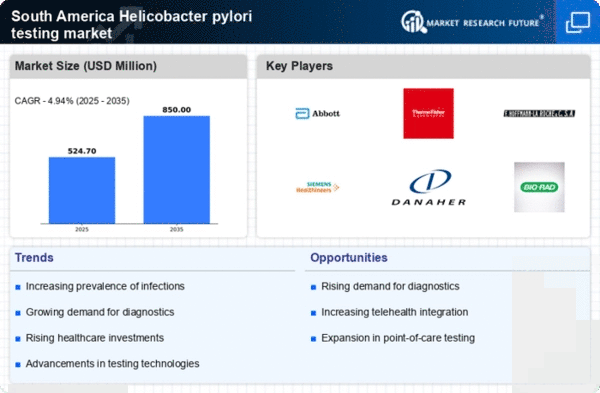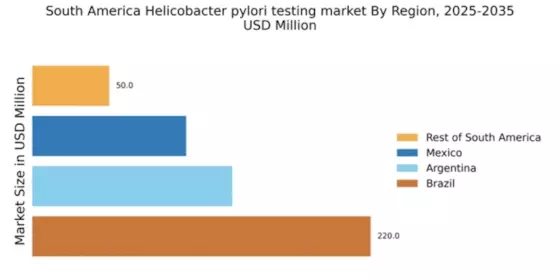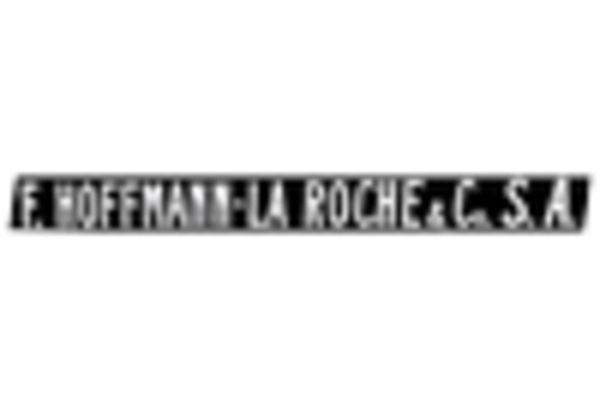Expansion of Healthcare Infrastructure
The ongoing expansion of healthcare infrastructure in South America significantly impacts the helicobacter pylori-test market. Governments and private entities are investing in healthcare facilities, which enhances access to diagnostic services. For instance, the establishment of new clinics and hospitals in rural areas is expected to increase the availability of H. pylori testing. This expansion is accompanied by a growing emphasis on preventive healthcare, which encourages routine testing for gastrointestinal disorders. As healthcare systems improve, the helicobacter pylori-test market is poised to benefit from increased testing capabilities and a broader patient base, potentially leading to a market growth rate of around 8% annually.
Advancements in Diagnostic Technologies
Advancements in diagnostic technologies are playing a pivotal role in shaping the helicobacter pylori-test market. Innovations such as non-invasive breath tests and rapid antigen detection kits are enhancing the accuracy and efficiency of H. pylori diagnosis. These technological improvements are particularly beneficial in South America, where traditional testing methods may be less accessible. The introduction of more user-friendly and cost-effective testing options is likely to attract a broader demographic, including those who may have previously avoided testing due to cost or complexity. As these technologies become more widely adopted, the helicobacter pylori-test market is expected to experience substantial growth, with an estimated increase in market value of around $200 million by 2028.
Rising Demand for Point-of-Care Testing
The demand for point-of-care testing (POCT) is emerging as a significant driver in the helicobacter pylori-test market. Patients and healthcare providers are increasingly favoring rapid testing solutions that provide immediate results. This trend is particularly relevant in South America, where access to laboratory facilities may be limited in remote areas. POCT for H. pylori allows for timely diagnosis and treatment, which is essential for managing gastrointestinal health. The convenience and efficiency of these tests are likely to attract more patients, thereby expanding the helicobacter pylori-test market. Market analysts project that the POCT segment could account for over 30% of the total market share by 2027.
Growing Awareness of Preventive Healthcare
The growing awareness of preventive healthcare among the South American population is driving the helicobacter pylori-test market. As individuals become more informed about the risks associated with H. pylori infections, there is a noticeable shift towards proactive health management. Educational campaigns and health initiatives are promoting the importance of regular testing, particularly for those exhibiting gastrointestinal symptoms. This cultural shift towards prevention is likely to increase the demand for H. pylori testing services. Consequently, the helicobacter pylori-test market is expected to see a surge in testing rates, potentially leading to a market growth of approximately 10% over the next few years.
Increasing Incidence of Helicobacter Pylori Infections
The rising incidence of Helicobacter pylori infections in South America is a crucial driver for the helicobacter pylori-test market. Studies indicate that approximately 50% of the population in certain regions may be infected, leading to a heightened demand for effective diagnostic testing. This trend is particularly evident in countries with limited access to healthcare, where awareness of gastrointestinal issues is growing. As more individuals seek medical attention for symptoms related to H. pylori, the market for testing is likely to expand. Furthermore, the correlation between H. pylori and serious conditions such as gastric cancer underscores the necessity for early detection, thereby propelling the helicobacter pylori-test market forward.

















